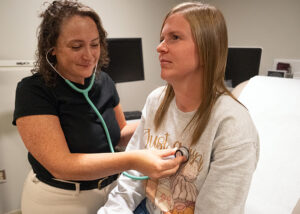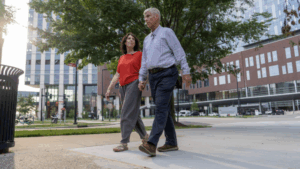COLUMBUS, Ohio – A unique urban gardening and science-based nutrition education program at The Ohio State University Comprehensive Cancer Center – Arthur G. James Cancer Hospital and Richard J. Solove Research Institute (OSUCCC – James) focuses on reacclimating people to a love of food and taste post-cancer treatment, but it also has ancillary benefits: peace and healing in community.
Known as the Garden of Hope, the program provides access to fresh produce aligning with national oncology guidelines for promoting a plant-focused dietary pattern plus evidence-based nutrition education provided by registered dietitians.
More than 200 patients and as many of their loved ones participate in the program annually, which offers free weekly vegetable and herb harvests, as well as individual nutrition counseling, hands-on nutrition educational opportunities and cooking demonstrations.
“Eating fruits and vegetables is super important for everybody, but especially for cancer survivors because these foods are so high in vitamins, minerals, fiber, phytochemicals. Scientific studies show that a plant-rich diet may lower the risk for cancer and is recommended for cancer survivors,” said Dena Champion, RD, CSO, a dietitian and postdoctoral student specializing in oncology nutrition who helps facilitate the Garden of Hope program.“Seeing the food growing can really provide people with a deeper connection to their food and influence overall healthier dietary patterns. Our goal is to give survivors an appreciation for healthy foods for a lifetime.”
Dietary changes, education through gardening
Through the Garden of Hope, dietitians provide evidence-based nutritional information and education on the benefits of a plant-based diet. The 1.5-acre garden is located at the Waterman Agricultural and Natural Resources Laboratory on The Ohio State University campus. Registered participants for the two-year Garden of Hope program can harvest over 100 varieties of produce, including vegetables, herbs, fruits and edible flowers from June-October. During scheduled harvest sessions, staff are available to answer gardening and nutrition questions.
Breast cancer survivor Molly Miely says her cancer diagnosis was life-changing in a different way, but the Garden of Hope was life-changing in all ways.
“I never cooked with fresh vegetables or gardened before joining the Garden of Hope, but getting my hands in the dirt was so peaceful. It turned a dark time in my life into a healing experience, and I now have cherished memories harvesting with my grandkids and feel empowered to make healthier nutrition choices.”
Cultivating wellness, empowering cancer survivors
Champion is spearheading a pilot study to assess how urban gardening impacts cancer survivors’ nutrition and overall health. The study measures changes in dietary habits, quality of life, nutrition security and carotenoid levels over two years. Carotenoids are plant pigments with cancer-fighting properties.
“Cancer survivors often face nutritional challenges from therapy, previous eating patterns and conflicting dietary advice. Programs like urban gardening and evidence-based nutrition education can support healthy, lasting habits essential for survivorship,” Champion noted.
For this study, participants harvest produce weekly during the five-month growing season and can attend nutrition sessions. Researchers collect baseline and post-program data, using non-invasive tools to track skin carotenoid levels.
“Our findings show the Garden of Hope is a valuable bridge in transitional care, offering support and improved quality of life after treatment,” said Champion.
For more information about the Garden of Hope and JamesCare for Life Supportive Services, visit cancer.osu.edu.




